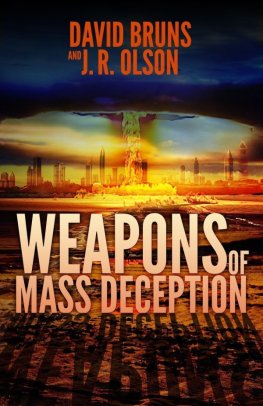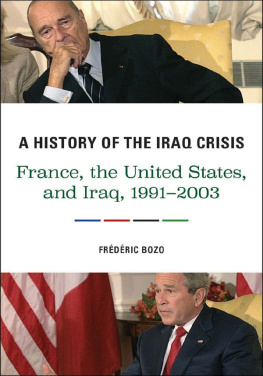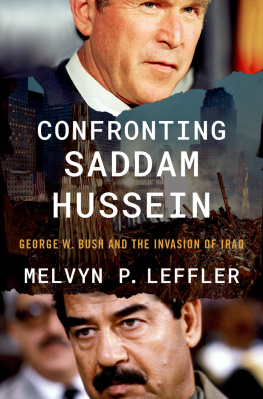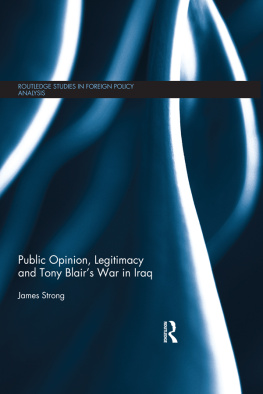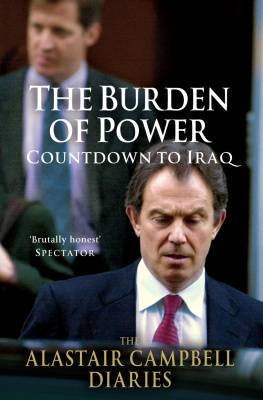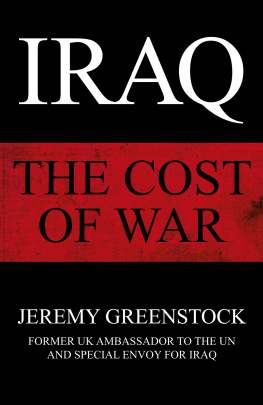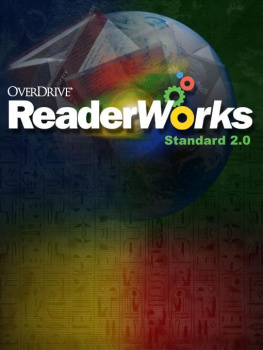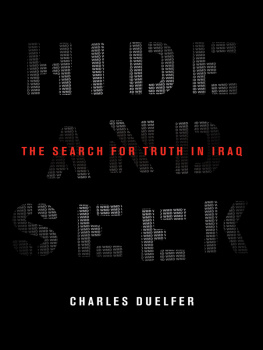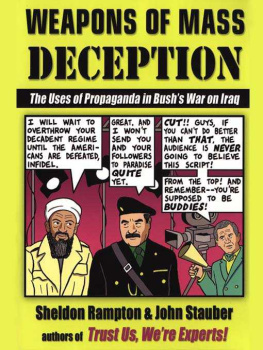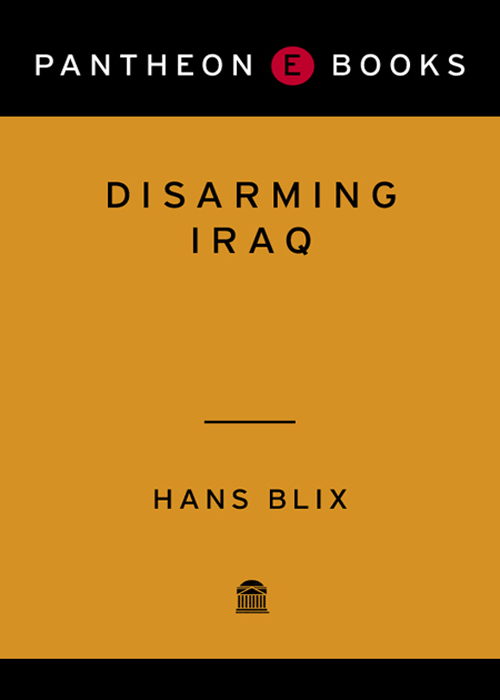
Disarming Iraq
HANS BLIX

Pantheon Books, New York
Contents
1: |
2: |
3: |
4: |
5: |
6: |
7: |
8: |
9: |
10: |
11: |
12: |
To the staff at the United Nations Monitoring, Verification and Inspection Commission (UNMOVIC)
Disarming Iraq
Introduction
When I retired as director-general of the International Atomic Energy Agency (IAEA) in November 1997 and returned to Stockholm, I planned to write a book about the IAEAs inspection experience in Iraq and North Korea. But before I could start work on that project, Kofi Annan, the secretary general of the United Nations, asked me to become the executive chairman of the newly created UN Monitoring, Verification and Inspection Commission for Iraq (UNMOVIC).
Having studied at Columbia University's law school from 1954 to 1956, I was at home in New York and I loved the city. The fact that my younger son was now pursing his Ph.D. at my old university and that I was able to meet him and his wife for dinner every so often added warmth to my life. The ease and low cost with which one can telephone across the Atlantic allowed for daily conversations with my wife, Eva. To our elder son in Stockholm I kept writing letters, which eventually formed a diary that turned out to be of great help when I wrote this book. My family network provided love and stability during a period of excitement and pressure. Yirka and Ed Emerson, close and dear friends from my school days in New York, made sure that I got to see the important plays on and off Broadway. Our joint expeditions provided an essential counterbalance to my own life on and off the political stage over at the UN.
Some time in the spring of 2003 Per Gedin, an old friend from my student days in Uppsala and a very successful publisher, contacted me to say that I must write a book about my experiences in the Iraq affair. He brought me into contact with Albert Bonnier, who would become my Scandinavian publisher, and they got me to agree to write this book when I left the Commission. It was not difficult to persuade me to do so. I knew that I had lived through an important sequence of events in contemporary history. Diplomats and statesmen would describe their parts in these events from their various vantage points. I thought it was important that what transpired on the central UN stage should be described by someone who had actually been there.
I was lucky to be advised to contact the literary agent Jane Gelfman. She and Albert Bonnier encouraged me throughout the writing process. I have enjoyed and appreciated their sophisticated judgment, their friendship, and their professional competence. In Stockholm, Anders Mellbourn, director of the Institute of International Affairs, and in New York, Dan Frank, editorial director of Pantheon Books, have devoted much time and energy to helping me edit my drafts. I am very grateful to them for the skillful and gentle way they have gone about this difficult and hectic work.
Dimitri Perricos was always an energetic force. I knew that he would ensure that UNMOVIC inspections were professionally and competently carried outand he did. He was kind enough to read through the entire book and helped me to correct errors when my memory led me astray. I am indebted to him for this and for all the valuable advice he has given me. I am also indebted to Ewen Buchanan and Geoffrey Allan for keeping me continuously informed via e-mail of what has been happening in Iraq since I left New York in the summer of 2003.
Stockholm
January 2004
Disarming Iraq: Moments of Truth?
Invasion Instead of Inspection
On the afternoon of Sunday, March 16, 2003, I was in my office on the thirty-first floor of the United Nations Secretariat building in New York, the headquarters of the UN Monitoring, Verification and Inspection Commission for Iraq (UNMOVIC). Some of my close collaborators had joined me to put the final touches on a work program I was to submit to the Security Council.
When our commission was established by a Security Council resolution in December 1999, the Council had recognized that there might still be weapons of mass destruction (WMD) in Iraq, despite the fact that a great deal of disarmament had been accomplished through UN inspections after the end of the Gulf War in 1991. In November 2002, a new round of inspections had been initiated to resolve key remaining tasks in the disarming of Iraq.
Although the inspection organization was now operating at full strength and Iraq seemed determined to give it prompt access everywhere, the United States appeared as determined to replace our inspection force with an invasion army. After the terror attacks on New York and Washington on September 11, 2001, a policy of containmentkeeping Saddam Hussein in his boxand ensuring the disarmament of Iraq through UN inspections was deemed no longer acceptable.
The people around me were all solid professionals coming from different parts of the world. There was Dimitri Perricos, probably the worlds most experienced inspector. A Greek and by profession a chemist, he had more than twenty years of experience with international nuclear inspectionsin Iraq, North Korea, South Africa and many other places. He was the head of operations. Muttusamy Sanmuganathan, known to all as Sam, was from Sri Lanka. Both Dimitri and Sam had worked closely with me for many years in Vienna, when I was the director general of the International Atomic Energy Agency (IAEA). Ewen Buchanan, a Scot, was our manager of media relations and institutional memory. For years he had been a political expert and the spokesman of the previous inspection authority, the UN Special Commission (UNSCOM). There was Torkel Stiernlf, who had been stationed in Baghdad and knew Arabic. He was about to return to his job at the foreign ministry in Stockholm after six intense months as my executive assistant. Lastly, there was Torkels successor, Olof Skoog, an ambassador at the early age of 35 and on loan to me.
The military invasion of Iraq was all but announced and here we were at the UN sketching a peaceful way to try to ensure the countrys disarmament! The military force, whose buildup had begun in the summer of 2002 and had been an essential reason why Iraq had accepted the inspectors back, had reached invasion strength and was now waiting to be deployed.
In the Security Council, all efforts to reach agreement on what might be demanded of Iraq in the next few weeks had collapsed. Proposals had been made by the British that Saddam Hussein should go before Iraqi television and declare his determination to disarm and to cooperate fully with the inspectors. The declaration would be accompanied by Iraqs fulfillment of a number of specific disarmament tasks within a very short timeperhaps ten days. (The approach had some similarity to the British efforts which ten months later would prompt Libyas leader, Colonel Muammar Qaddafi, to declare that Libya was stopping all efforts to acquire weapons of mass destruction and would open up for thorough inspection.) The U.S./UK would consider themselves authorized to take armed action against Iraq if they determined that Iraq was in non-fulfillment of the demands.
While the guidelines in the December 1999 UNMOVIC resolution were perfectly valid and called for a work program covering a first period of 120 days of inspections, the U.S., the UK and Spain had been taking their cues from Security Council Resolution 1441, adopted on November 8, 2002. In their reading, this resolution gave Iraq only a limited time and a last opportunity to cooperate to attain disarmament or else face serious consequences. That limited time, in their view, had now expired. Others in the Security Council thought the process of inspections required more time. They were not ready, at this stage, to authorize serious consequencesarmed action. Most member states of the Council were of the view that such a decision was for the Council collectively, not for individual members, as the U.S. and the UK insisted.
Next page

